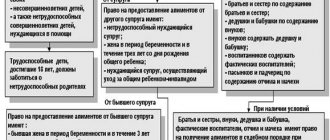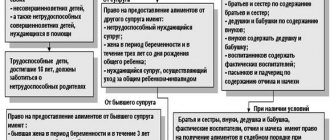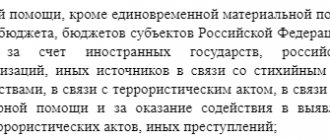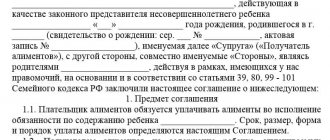The collection of alimony for a spouse is not uncommon these days, and increasingly people turn to our lawyer for legal assistance in this area.
Our family lawyer will help you avoid getting confused in this issue, and will also submit an application for an increase in alimony in accordance with the needs of the spouse and child.
In what cases can you demand financial support during a divorce?
The Family Code provides for 4 grounds for receiving alimony from a husband. Alimony for an ex-wife is prescribed in the following cases:
- pregnancy with a common child, as well as caring for him for 3 years after birth;
- caring for a disabled child;
- the wife's neediness and incapacity for work (receiving disability before the divorce or within a year after it);
- need and reaching retirement age no later than 5 years after the divorce (alimony is paid if the spouses have lived together for a long time).
IMPORTANT! A woman has the right to alimony for her maintenance only if the marriage has been officially registered.
It should be noted that even if there are grounds for receiving alimony, a woman cannot always collect it (you can find out more about how to collect child support here). In accordance with paragraph 1 of Art. 90, the court can oblige a man to support his ex-wife only if he has the necessary means for this.
Until what period will the transfer be necessary?
The obligation to support his ex-wife is removed from the man if there are no longer legal grounds for collecting financial assistance. The payment period depends on the following specific circumstances
- Alimony is prescribed for pregnancy or caring for a newborn. The payment period is until the child reaches 3 years of age.
- Due to the child's disability. If a dependent has been recognized as a group 1 disabled person, then alimony is paid to his mother indefinitely (even though she does not work due to the need to care for the child). If a woman is raising a common disabled child of group 2 or 3, then she can demand payments for her maintenance only until the dependent reaches adulthood.
- Due to the incapacity and need of the spouse. A man is exempt from payments if his ex-wife’s financial situation improves or she has regained her ability to work.
Grounds for termination
In what cases can a man be exempt from paying alimony:
- The woman remarries. In this case, the obligation to provide financial support passes to her new spouse.
- Ex-wife returning to work. If after the birth of the child the ex-wife began to work, then the man will pay alimony only for the dependent. The spouse will not have any grounds for demanding payments, since she has her own income.
- Improving the financial situation of the ex-wife. If a woman’s income has increased significantly, then she no longer falls under the “needy” category, which means that the husband has the right not to pay alimony.
ATTENTION! To be freed from financial obligations to your spouse, you must file a claim with the court with documents proving the absence of grounds for continued payments.
The amount of alimony for the maintenance of the ex-wife
For the plaintiff, this issue is significant, therefore, when filing an application, he can indicate the amount of maintenance. But it is necessary to understand that the amount collected for one of the minor’s parents must be adequate to the financial situation of the payer.
So, in practice, payments are assigned in an amount of no more than 50% of the money paid by the father and mother of the child for his maintenance.
For example, the father of a minor pays 10,000 rubles every month. He will transfer 5000 to the child’s mother, which is 50% of this amount.
Important! If a man already pays child support and a woman decides to claim money for her maintenance, the total amount to be transferred should not exceed 70% of his salary.
Who can be refused and when?
According to Art. 92 of the RF IC, the court may reject the ex-wife’s claim for alimony in three cases:
- The spouse's disability arose as a result of alcohol abuse, drug abuse , or the commission of an intentional crime. As evidence, the defendant may provide a medical examination report or a court decision.
- The spouse behaved unworthy in the marriage. The court may include child abuse, infidelity, alcohol or drug addiction as misbehavior.
- A short marriage between spouses. If a woman demands alimony from her ex-husband due to loss of ability to work, then the court takes into account the duration of their marriage. As practice shows, courts satisfy claims for alimony for wife maintenance if the spouses have lived in an official marriage for at least five years.
Article 92 of the RF IC. Release of a spouse from the obligation to support the other spouse or limitation of this obligation for a period
The court may release the spouse from the obligation to support another disabled spouse in need of assistance or limit this obligation to a certain period both during the marriage and after its dissolution:
- in the event that the incapacity for work of the spouse in need of assistance occurred as a result of the abuse of alcoholic beverages, drugs or as a result of his commission of an intentional crime;
- if the spouses are married for a short period of time;
- in case of unworthy behavior in the family of a spouse requiring payment of alimony.
These grounds for refusal do not apply to cases where a woman requests alimony in connection with caring for a newborn or a disabled child.
Possible failure
Refusal to assign alimony is possible in cases where the spouse has become unable to work due to having committed a crime.
Payments may also be denied if:
- the couple had not been married for long;
- when one of the spouses behaved unworthily in the family - drank, gambled (there are no exceptions for women in this regard);
- when the needy spouse committed a crime against the second marriage partner.
In some cases, other circumstances may be grounds for refusing to grant alimony to a wife. In any case, the final decision in awarding alimony is made by the court.
How much is the amount?
If the wife has filed an application, then the amount of payments can be established by the former spouses independently (if they enter into a notarial agreement) or by the court. According to Art. 91 of the RF IC, the amount of benefits is set in a fixed monetary amount. Alimony is paid monthly. When deciding on the amount of payments, the court takes into account:
- the level of living wage in the region of residence of the recipient of funds;
- the amount of income of the parties;
- Family status.
Size for wife and child
REFERENCE. If payments to the wife are set in a fixed amount, then child support can be assigned both in a fixed amount and as a percentage of the salary.
The interest rates for alimony are as follows:
- 25% for 1 dependent;
- 30% for 2;
- 50% for three or more.
If the ex-spouse has to pay double alimony (for both the child and the wife), then when setting the amount of payments for one child and the mother, the court is also guided by Art. 99 Federal Law No. 229 “On Enforcement Proceedings”. According to the law, according to the executive document, more than 70% cannot be withheld from wages.
Payment methods
Financial support for an ex-wife can be paid by a man either voluntarily (a notarial alimony agreement is concluded) or compulsorily (through the court).
A voluntary agreement allows spouses to independently determine the frequency and amount of payments. They can stipulate in the agreement any methods of paying alimony. There are the following options for paying child support:
- in a fixed amount;
- as a percentage of income;
- in property equivalent, etc.
If a woman seeks alimony through the court, then in the statement of claim she may demand a specific amount, form and method of payment. The judge will take into account the requirements, but at the same time will proceed from the norms of the law, the family and financial situation of both parties.
How can the mother of a child file a claim against her ex-husband?
You need to start the process by writing a statement of claim and collecting documents confirming the grounds for collecting payments (you can find out more about how to write an application for the issuance or cancellation of a court order to collect child support here).
Statement of claim
How to file an application to the court? The following procedure for writing an application is accepted:
- The header contains the court data (city, plot number), information about the plaintiff and defendant (full name, residential address, date of birth).
- The title of the document is “Application for the collection of alimony for a spouse.”
- In the main part you need to describe the situation, citing facts relevant to the case:
- date of marriage;
- date of divorce;
- information about children (if any);
- family and financial status;
- lack of financial assistance from a man;
- disability, etc.
- Links to articles of law that grant the plaintiff the right to demand alimony.
- Request for alimony. You must indicate the size, form and method of payment.
- List of documents confirming the existence of grounds.
- Date and signature.
The application is drawn up in three copies. One is handed over to the judge, the second (with a note of acceptance) remains with the plaintiff, the third is sent by the court to the defendant’s address.
The rules for filing a claim can be found here.
Documentation
The following documents must be submitted:
- copy of passport;
- certificates of income of the plaintiff and defendant, as well as other documents that can confirm the real level of income;
- a copy of the marriage certificate and its divorce.
The full list of papers depends on the grounds on which the plaintiff requests alimony. The documents on which the requirements are based may be:
- a certificate from a medical institution confirming the disability of the child or spouse;
- medical certificate about pregnancy;
- child's birth certificate;
- certificate of family composition;
- certificate from work confirming your stay on maternity leave;
- documents indicating financial need.
ATTENTION! Supporting documents can be not only certificates of income or benefits received, but also papers confirming expenses for urgent needs (receipts for payment of housing and communal services, checks for the purchase of medicines, etc.).
Step-by-step instruction
How to collect alimony:
- Choose a court. The statement of claim can be sent either to the place of residence of the defendant or to the place of one’s own registration. Cases regarding the collection of alimony are heard in the magistrate's court (more information about where to go to apply for alimony can be found here).
- Submit documents. The application and papers must be sent to the court office (in person or by mail). There is no fee charged to a plaintiff wishing to collect alimony. The amount is withheld from the defendant if the plaintiff wins the case in court.
- Wait for a response from the court. The period for consideration of the application is no more than 30 days. After this, the participants in the process are invited to a hearing, where each party can defend its interests.
- Receive a writ of execution. Send him to the place of work of the ex-husband (if he works officially) or to the bailiff service (you can find out more about how to collect alimony from an officially unemployed father here).
More information about how to collect alimony can be found here.
State duty for the collection of alimony
This is a fee charged by the government for the provision of legal services. The size is indicated in Art. 333, part 1, clause 14: is 150 rubles. If in court the plaintiff makes a claim for the maintenance of not only the child, but also himself, the fee increases and amounts to 300 rubles.
If the plaintiff turns to the magistrate to issue an order, then the claimant pays a state fee in the amount of 50% of the amount of the fee, the amount of which is established for claims of a property nature.
The fixed amount of the state fee, equal to 150 rubles, is due to the legal requirement that the claim for alimony is not subject to assessment. And 150 rubles are transferred to the state budget regardless of the number of children for whom it is planned to request the collection of payments.
Nuances of transferring to a disabled wife
In accordance with Art. 90 of the RF IC, a disabled ex-wife has the right to alimony. Receiving alimony is possible if the following conditions are met:
- disability of 1 or 2 groups, which was received during the marriage or within a year after its dissolution;
- poor financial situation.
The amount of alimony is determined based on the financial and marital status of the participants in the process, the costs of treatment and care of the plaintiff, and the cost of living. Payments are set in a fixed amount.
To collect alimony, the plaintiff must provide the court with documents confirming disability and need. The following documents are supporting documents:
- certificate from a medical institution;
- income certificate;
- documents on expenses for urgent needs;
- certificate of family composition, etc.
IMPORTANT! The court may refuse to award payments if the defendant proves that the plaintiff became disabled as a result of immoral behavior: alcohol abuse, drug abuse, or a crime.
The judge also takes into account the number of years lived in marriage. The longer the spouses were in an official relationship, the higher the plaintiff’s chances of receiving alimony.
It is possible to recover alimony from a spouse only if his income allows it and there are grounds for recovery. It is also important to provide the court with the evidence on which the claim is based. A well-written application with references to laws and clear wording will be an advantage.
When alimony is not due to the ex-spouse
There are situations when alimony for the child’s mother cannot be collected due to the fact that the court refuses this action. For example, this happens in situations:
- the presence of a short-term marital relationship (duration of marriage - less than one year);
- immoral behavior in the official marriage of the person demanding alimony (infidelity, drunkenness, drugs);
- one party becomes incapacitated due to their own fault (for example, being injured while drunk);
- concealing the real amount of income in order to receive additional payments in the form of alimony.
You can get alimony canceled at any time. As soon as the payer understands that the recipient’s financial condition has improved, if the wife works and receives decent money, it is necessary to file a claim to cancel her maintenance.









